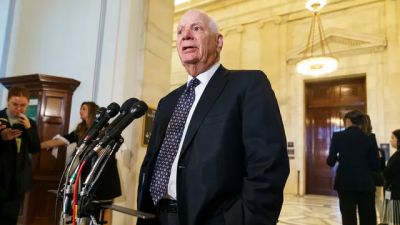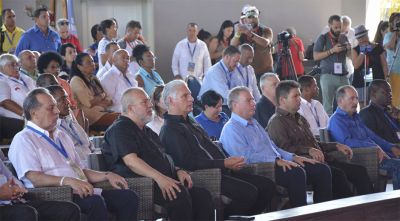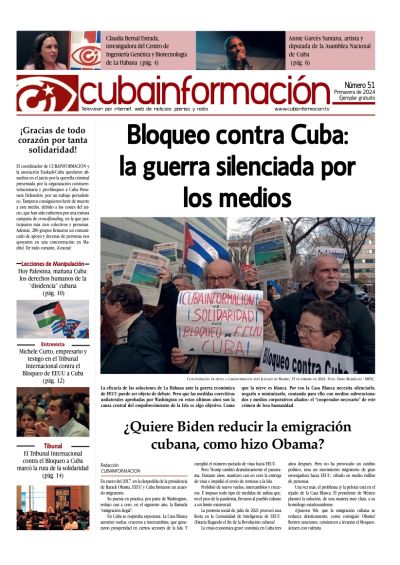Ben Cardin, presidente del Comité de Relaciones Exteriores del Senado de Estados Unidos. Foto: The Hill.
Coalición en EEUU pide fin del bloqueo a Cuba
Washington, 2 abr (Prensa Latina) Líderes políticos, religiosos y de derechos civiles de Maryland pidieron hoy a Ben Cardin utilizar su influencia como presidente del Comité de Relaciones Exteriores del Senado de Estados Unidos para levantar el bloqueo a Cuba.
En una carta enviada al senador saliente este martes, la coalición de más de un centenar de grupos e individuos argumentaron que las sanciones de Estados Unidos a Cuba son la causa principal de las terribles condiciones humanitarias y económicas en la isla.
“El embargo (bloqueo) económico, comercial y financiero de Estados Unidos a Cuba ha estado en vigor durante más de 60 años. En ese tiempo, su efecto principal ha sido el sufrimiento masivo del pueblo cubano”, escribieron.
La solicitud de los grupos se produce cuando Cuba enfrenta su crisis económica más terrible desde el final de la Guerra Fría en medio de una serie de sanciones estadounidenses, incluida la designación en la lista de Estados Patrocinadores del Terrorismo, señaló un artículo publicado en el diario The Hill.
Esa designación ha sido especialmente controvertida, ya que excluye a Cuba de una gran parte del sistema financiero internacional y dificulta que terceros países comercien con la isla.
Cardin fue visto como un actor clave en la estrategia de acercamiento de la administración de Barack Obama (2009-2017) hacia Cuba.
La coalición de Maryland detrás de la carta argumentó que si bien la política entre Estados Unidos y Cuba no está sólo en sus manos, no hay duda de que el presidente de ese comité tiene una “influencia única, tanto para aprobar leyes como para influir en la acción ejecutiva”.
Al igual que otros grupos pro-acercamiento, también ven una ventana de oportunidad, ya que Cardin asumió después que el senador Bob Menéndez (demócrata por Nueva Jersey), cuya posición anticubana en el Congreso es destacada, se vio obligado a dimitir en medio de un escándalo de corrupción y otras acusaciones federales relacionadas.
Recuerdan que, durante muchos años, el senador Menéndez ejerció su poder para obstruir cualquier medida de alivio para el pueblo cubano.
Es probable que la ventana de oportunidad se cierre al final de este Congreso, ya que los demócratas enfrentan una batalla cuesta arriba para retener el control del Senado y los republicanos están, en su conjunto, más estrechamente alineados con una política de máxima presión sobre Cuba, advirtieron.
Los líderes de derechos civiles de Maryland coincidieron en que tienen diversidad de criterios, pero en algo están unidos: “nuestra oposición a medidas que, durante más de medio siglo, no han resultado más que en sufrimiento generalizado”.
Concluyeron que “como comunidades de fe moralmente opuestas al uso de la guerra económica contra nuestros hermanos cubanos; como grupos de la diáspora preocupados por el desplazamiento de personas de sus hogares; como humanitarios, académicos, activistas y defensores de los derechos humanos; decimos inequívocamente que es hora de poner fin al embargo a Cuba”.
Maryland faith, civil rights leaders to Cardin: Lift the Cuban embargo
Rafael Bernal
The Hill
A coalition of Maryland civil rights, religious and political leaders is calling on outgoing Sen. Ben Cardin (D-Md.) to use his clout as chairman of the Senate Foreign Relations Committee (SFRC) to end the U.S. embargo on Cuba.
In a letter to Cardin Tuesday, more than 100 groups and individuals made the case that U.S. sanctions on Cuba are a primary cause of dire humanitarian and economic conditions on the island.
“The US economic, commercial, and financial embargo of Cuba — referred to by some as a blockade for its effects on third parties — has been in place for over sixty years. In that time, its primary effect has been the mass suffering of the Cuban people,” they wrote.
The groups’ request comes as Cuba faces its most dire economic crisis since the end of the Cold War amid an array of U.S. sanctions, including designation in the State Sponsors of Terrorism list.
That designation has been especially controversial, as it excludes Cuba from a large swath of the international financial system, and makes it harder for third countries to trade with the island.
Cardin was seen as a key player in the Obama administration’s rapprochement strategy toward Cuba, though he has been sharply critical of the communist government’s human rights record.
The Maryland coalition behind the letter is calling on Cardin to use his influence on the topic as part of his Senate swan song.
“While US-Cuba policy is not in your hands alone, there is no doubt that the Chair of the SFRC holds unique influence, both to pass legislation and to influence executive action,” they wrote.
Like other pro-rapprochement groups, they also see a window of opportunity, as Cardin took over the SFRC role from Sen. Bob Menéndez (D-N.J.), a Cuba hardliner who was forced to step down as chairman amid corruption allegations and a slew of related federal indictments.
It’s Cardin’s second stint filling in for Menéndez — from 2015 to 2018, he replaced Menéndez as the top Democrat on the committee while the New Jersey senator fought off a separate corruption indictment ahead of his 2018 reelection.
This time, both Menéndez and Cardin are set to step down at the end of this term, though Menéndez has said he will consider running as an independent Democrat if he is able to shake off the federal indictments by the summer.
“For many years, Senator Bob Menendez wielded that power to obstruct any measure of relief for the Cuban people. However, following his indictment on bribery charges, you have assumed this powerful position, and the opportunities that come with it,” wrote the groups.
The window of opportunity is likely to close at the end of this Congress, as Democrats face an uphill battle to retain control of the Senate, and Republicans are, as a whole, more closely aligned on a policy of maximum pressure on Cuba.
The Maryland civil rights leaders did not defend the Cuban regime’s human rights record, nor its economic management, but wrote that the embargo, with its share of blame for misery on the island, should end.
“We hold a diversity of opinions on the government of Cuba and regarding the exact relationship that that our two countries should ultimately have. We also recognize that the challenges faced by the Cuban people are not attributable to the embargo alone,” they wrote.
“But, we are united in our opposition to measures that have, for over half a century, resulted in nothing but widespread suffering. As faith communities morally opposed to the use of economic warfare against our Cuban siblings; as diaspora groups concerned with the displacement of people from their homes; as humanitarians, scholars, activists, and defenders of human rights; we say unequivocally that it is time to end the embargo on Cuba.”











